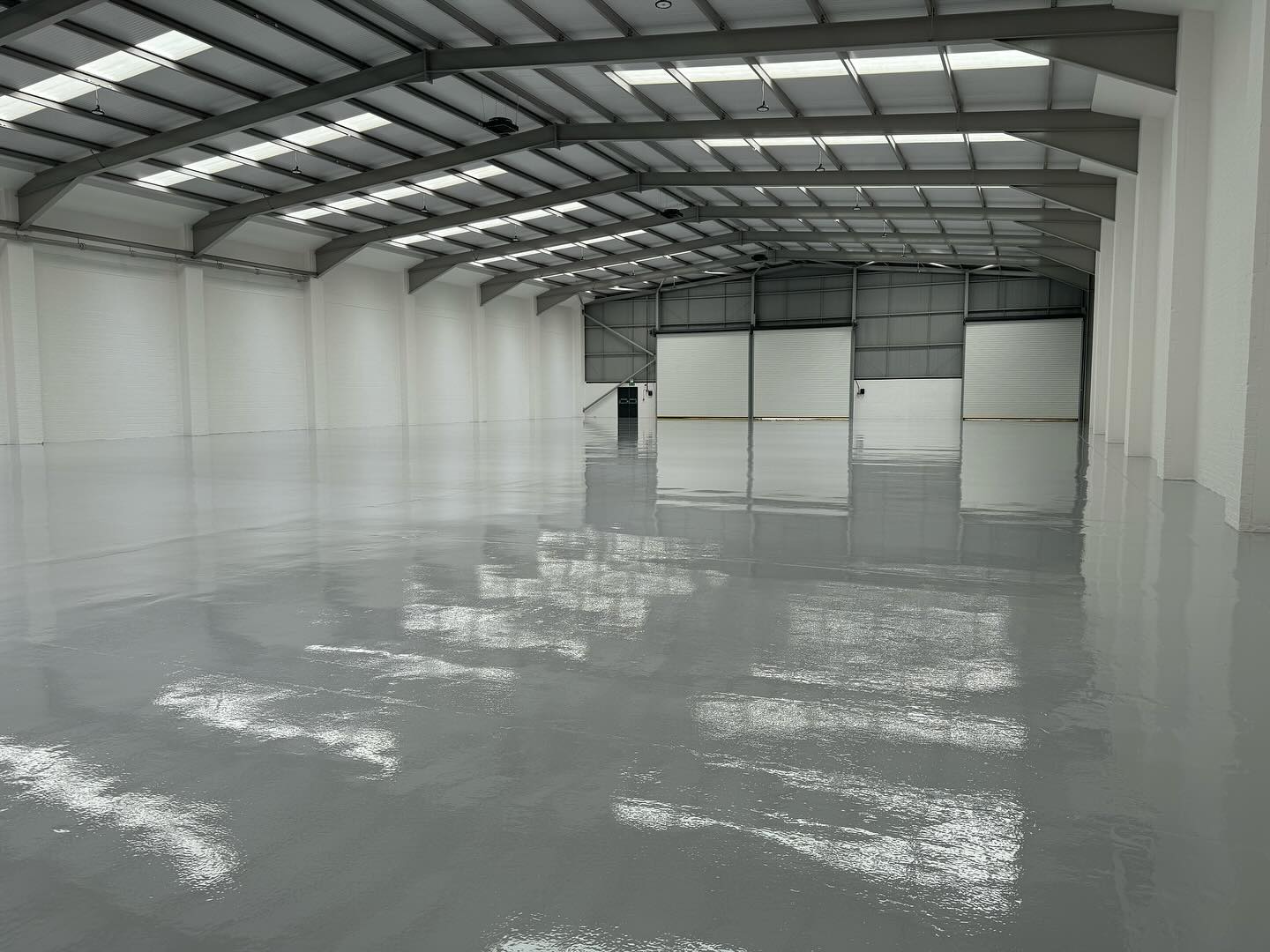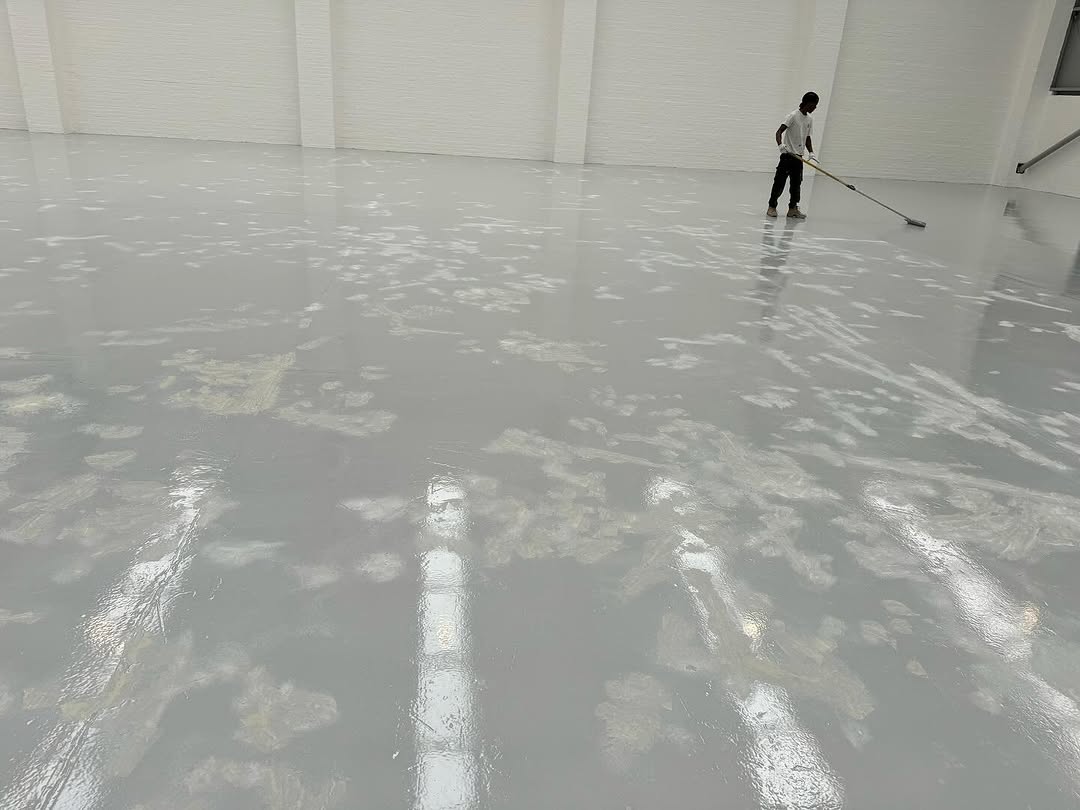Seamless epoxy flooring eliminates the 3-5mm grout lines that make tiles unsuitable for most industrial applications, providing a hygienic, chemical-resistant surface that costs £11-15 per m² installed. While tiles may seem cheaper initially at £11-15 per m² installed, their ongoing maintenance, hygiene issues, and failure under heavy loads make them 40% more expensive over 10 years in industrial settings.
After removing over 50,000 square metres of failed tile installations from industrial facilities, we understand exactly why seamless epoxy resin systems have become the standard for modern warehouses, factories, and food production areas. The comparison isn't just about aesthetics – it's about fundamental performance differences that impact your operation daily.
Why Hygiene Makes Tiles Impossible for Food Production
Every grout line in a tiled floor creates a bacterial highway. Even epoxy grout, marketed as "hygienic," remains porous enough to harbour listeria, salmonella, and other pathogens. Our testing in food facilities shows bacterial counts in grout lines exceeding 10,000 CFU/cm² even after professional cleaning.
Seamless epoxy eliminates these contamination zones entirely. The monolithic surface leaves nowhere for bacteria to hide, achieving bacterial counts below 10 CFU/cm² with standard cleaning protocols. This isn't just cleaner – it's the difference between passing and failing hygiene audits.
Temperature cycling in food production areas causes tiles and grout to expand at different rates, creating microscopic cracks where moisture and bacteria penetrate. Steam cleaning, essential in food facilities, accelerates this deterioration. Within 18 months, most tiled food production floors show visible mould growth beneath the surface.

How Heavy Loads Destroy Tile Floors
Industrial tiles rated for "heavy duty" typically handle 30-40 N/mm² compression strength. However, this rating assumes perfect load distribution across the entire tile surface. In reality, forklift wheels create point loads exceeding 80 N/mm² at turning points, crushing tile edges and corners.
Our 6mm heavy-duty flooring systems distribute these point loads across the entire floor mass, handling over 70 N/mm² consistently. More importantly, the flexibility in the resin absorbs impact energy that would shatter rigid tiles. Dropped tools, pallets, and equipment that would crack tiles merely scuff epoxy surfaces.
| Load Type | Tile Performance | Epoxy Performance |
|---|---|---|
| Static Compression | 30-40 N/mm² | 50-70 N/mm² |
| Impact Resistance | Cracks at 2-3 Joules | Withstands 5-8 Joules |
| Forklift Turning | Edge crushing common | No damage |
| Thermal Shock | Cracks with 30°C change | Handles 50°C change |
| Chemical Resistance | Grout degrades quickly | Full protection |
Installation Time and Business Disruption
Tile installation seems straightforward but involves multiple trades and extended timelines:
- Substrate levelling and preparation (2-3 days)
- Waterproof membrane application (1 day + drying)
- Tile laying for 1000m² (5-7 days)
- Grouting and cleaning (2 days)
- Cure time before traffic (3-5 days)
- Total disruption: 15-20 days
Epoxy installation streamlines the process:
- Surface preparation (1-2 days)
- Primer and base coat (1 day)
- Body coat application (1 day)
- Top seal and cure (2 days)
- Total disruption: 5-7 days
Replace Your Problem Tiles with Seamless Epoxy
We specialise in removing failed tiles and installing hygienic, durable epoxy systems. Free assessment of your existing floor included.
Get Your Tile Replacement QuoteThe Hidden Maintenance Burden of Tiles
Tile maintenance extends far beyond routine cleaning. Grout requires annual resealing, costing £11-15 per m². Contact us for a precise quote based on your specific project requirements. Even with religious maintenance, grout discolours within months, creating an perpetually dirty appearance regardless of actual cleanliness.
Cracked tiles can't be ignored – they create trip hazards and hygiene violations. Replacement requires matching tiles (often discontinued), removal without damaging adjacent tiles, and colour-matching new grout to aged surrounding areas. Each repair typically costs £11-15 per m² when including labour.
Epoxy maintenance involves daily cleaning and periodic recoating every 7-10 years. Minor damage repairs invisibly with colour-matched resin applied directly over the affected area. No special stock-holding, no matching issues, no grout to maintain.
True 10-Year Cost Comparison
| Cost Element (per m²) | Tiles | Epoxy |
|---|---|---|
| Initial Installation | £11-15 per m²-£11-15 per m² | £11-15 per m²-£11-15 per m² |
| Annual Maintenance | £5-£8 | £1-£2 |
| Repairs (10 years) | £11-15 per m²-£11-15 per m² | £5-£8 |
| Grout Resealing | £15-£11-15 per m² | £11-15 per m² |
| Downtime Costs | £10-£15 | £3-£5 |
| 10-Year Total | £11-15 per m²-£11-15 per m² | £11-15 per m²-£11-15 per m² |

Safety Performance in Industrial Settings
Wet tiles become skating rinks, regardless of their supposed slip rating. Water fills the microscopic texture that provides grip, creating a hydroplaning effect. Our slip testing shows tiles dropping from R11 (safe) to R8 (dangerous) when wet.
Epoxy incorporates aggregates for anti-slip flooring throughout the coating thickness, maintaining R11-R13 ratings even when wet. Unlike tiles where slip resistance degrades with wear, epoxy maintains its rating throughout its life as fresh aggregate continuously exposes.
Grout lines create trip hazards as they wear unevenly or tiles lift at edges. UK HSE reports show 23% of warehouse trips involve flooring transitions or damaged tiles. Seamless epoxy eliminates these hazards entirely.
Thermal Movement and Building Stress
Large tiled areas require movement joints every 6-8 metres to accommodate thermal expansion. These joints fill with compressible material that degrades under traffic, creating weak points for water ingress and bacterial growth. Most facilities have 30-50 linear metres of movement joints per 1000m².
Epoxy's slight flexibility accommodates normal building movement without joints across most floor plates. Only structural movement joints require special treatment, typically using flexible polyurethane joint systems that maintain hygiene standards.
When Tiles Make Sense (Rarely in Industry)
Tiles suit specific scenarios:
- Small areas under 50m² where seamless isn't cost-effective
- Decorative reception areas prioritising aesthetics
- Laboratories requiring easy panel replacement
- Historic buildings where matching is essential
For virtually every industrial application – warehouses, factories, food production, pharmaceutical manufacturing – seamless epoxy provides superior performance. The hygiene advantages alone justify epoxy in any facility handling food, medicine, or sensitive products.
If you're dealing with existing tiles, explore our guide on applying epoxy over tiles to avoid removal costs. For new installations, there's simply no technical justification for choosing tiles over seamless resin systems in industrial environments.
Upgrade to Seamless Industrial Flooring
Join hundreds of facilities that have eliminated their tile problems with hygienic, durable epoxy systems. 20-year warranty available.
Get Your Free Quote